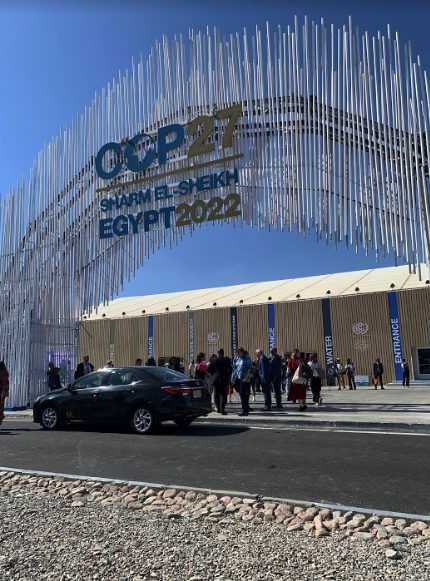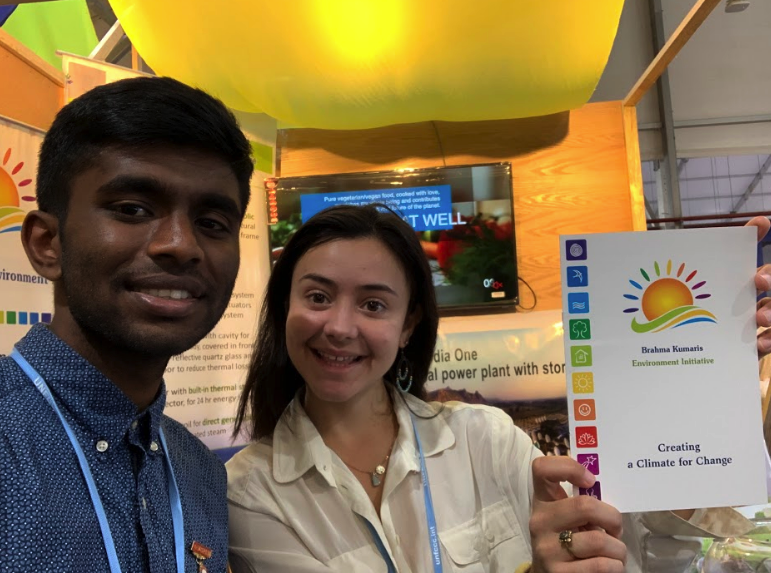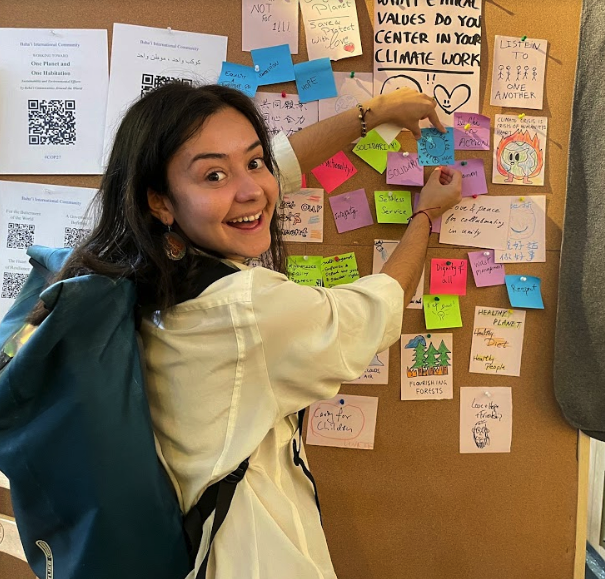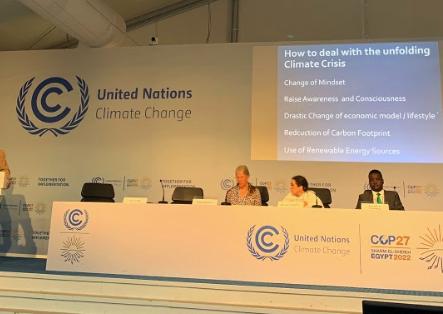This website uses cookies so that we can provide you with the best user experience possible. Cookie information is stored in your browser and performs functions such as recognising you when you return to our website and helping our team to understand which sections of the website you find most interesting and useful.
by Nela Cadinanos, WEAll Youth Member
Last month I attended COP27 in Sharm el-Sheij, Egypt, representing the Youth through various voluntary roles I play as part of my climate activism – these include advocacy for global movements like the WEAll Youth, and the BMW Foundation, and being representative of the Students’ Union at my university in Scotland.
Just about two weeks prior to COP27, I was offered a pass to attend the blue zone, a space within these annual conferences where negotiations for climate action take place. 197 parties are involved, alongside different non-state actors which are given accredited observer status to participate and make their contributions through different side-events, exhibitions, panels and so on. After this invitation, I entered a moral debate with myself trying to decide whether I should take the opportunity or not, particularly after finding out that many young activists from around the globe had decided not to attend to stand in solidarity with those forcefully oppressed by the Egyptian forces. “If they are not going, I must go” – I thought. This was my reasoning: despite the failures of the unfair system, and the counterproductivity of serving Coca-Cola and Nescafe at a conference that aims to protect our planet, I decided to go so that there would be another hopeful young voice on the conversations concerning our future. With only a week left for preparations, I ended up rearranging my schedule and getting extensions for university assignments, and arrived at this conference with the fresh and vibrant energy that I have been carrying for years, hopeful that the event will finally result in meaningful change.

Being my first COP, I have been immensely stimulated intellectually, physically, and emotionally by engaging in the most challenging conversations I have ever had. It’s been, indeed, a very enlightening experience from which, if I could highlight just one thing, it would be the people. Connecting with like-minded individuals, artists, activists, and organisations that share the same vision was special, and despite all the frustrations, the intensity, and the consequent burnout (which had me hibernating for three days due to sickness after I returned to Scotland) it was worth it.

There is a lot of controversy around the purpose of this conference, and it is obvious that the amount of “speaking” compared to the actual action taken from parties and states, can be very discouraging. “Implementation” was the keyword at COP27. But implementation must be exercised with a particular sense of urgency that I feel is often missed in these contexts, where people seem more focused on handing their (sustainable) business cards so they can expand their networks and continue with their (green) initiatives. On my first day in Egypt, at one of the night events, I remember feeling very confused. I did not know what all of it was about, the fancy drinks at expensive venues, the dresses, and the laughs. A guy approached me, and we had a brief conversation before he went on to show the biggest success of his day: an accumulation of business cards. He seemed very proud, and I was certainly astonished by the thickness of the set. I decided to go back to my apartment, feeling very strange. I would say that his collection of cards for the day was larger than the cards I had gathered during my entire stay at the conference. But I was not discouraged, nor ashamed, because every single card that was handed to me had a meaningful interaction behind it.
Overall, a key observation that I’ve had is how we are letting our egos and our roles come into action when we are surrounded by such high-reputational personalities, international organisations and world leaders. Our ambition and ‘growth’ mindset take over our pure intentions, as we get so carried away by the excitement of the opportunity to network. We might put our organisational interest first, to the level of completely missing the point of the COP, and the main mission why we engage with it, to protect the Earth. In many ways, this behaviour is representative of our current economic system, where counting the number of LinkedIn connections is equivalent to measuring success by GDP.
As someone who values meaningful human connections, one of the most fulfilling blessings from COP was meeting young changemakers, two of which deserve to be featured in this post. As part of their Cycle To Farms initiative, Aisha and Lukas cycled into Egypt from the Netherlands, on a mission to document regenerative farmer’s realities across the EU, the Middle East and Africa – read their adventures and experience at COP27 here! They are currently entering the third stage of their journey, with over 3000km awaiting in East Africa.

These kinds of projects are much needed to help raise awareness of alternative methods of operating, that go beyond the standard. After a month of reflection on my experience at COP27, I am realising how impactful elevating human consciousness could be in our aim to solve our crisis. Consciousness can change the way that we relate to each other, and our planet. During the conference, I was stunned to see that there was representation from initiatives such as the Brahma Kumaris (World Spiritual University) and the Bahá’í International Community.

As the urgency of the ecological crisis increases and merges with the cost-of-living crisis, and the subsequent spread of fear across society, it can be challenging to remain hopeful and to promote dialogues of hope. This is why having a holistic approach to taking care of ourselves and the world is essential as we move towards building a Wellbeing Economy. Bringing space of breathing and consciousness into decision-making processes, and international conferences is essential to switch off the growth mindset of constant productivity. I was grateful to attend the “Extreme Hangout – Giving Youth a Voice” on the morning of day 4, for a “regulation meditation with Qi-Gong and fire breathwork” session hosted by Wisdom Health at a hotel by the Red Sea. Interestingly, only young people took part in it. I wonder how different the dynamics would be if more of these practices were integrated and normalised within institutional processes. Especially since every year, the controversy and contradictions of the COP become increasingly notorious, and more voices are calling for the need to reimagine these conferences. Maybe, what we need to do, is to go back to our roots and reconnect with Mother Earth, as our ancestors did. Let’s leave the air-conditioned conference rooms and sit on the ground, in a circle, learning from each other, releasing judgements and assumptions while we collectively contribute to an alternative pathway to reach international agreements that will respond to the necessity of not only protecting, but saving our planet.
the discussion?
Let us know what
you would like
to write about!

